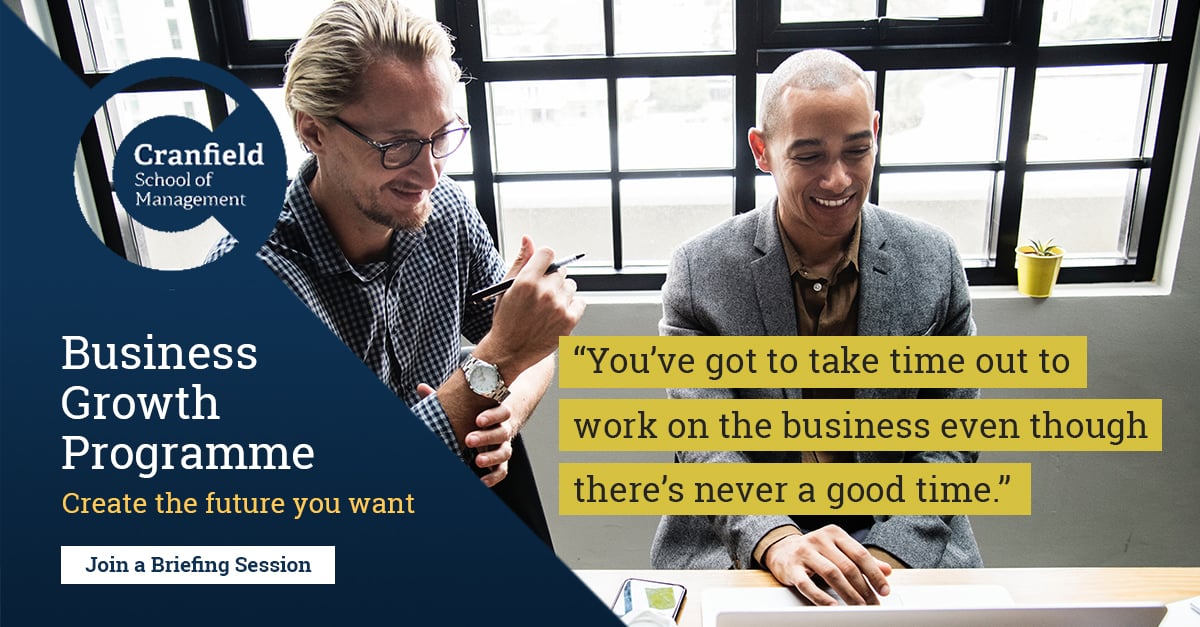“I’m exhausted. I feel like I’m always on the go. I’m finding it hard to cope. I’m not even sure I like my business anymore.”
Being an owner-manager can sometimes feel a bit like you’re in the film Groundhog Day. Every day you wake up and say: “Today, things are going to be different” – but they’re not. Every day people phone unexpectedly, there are new issues to deal with, and somehow you never quite feel like you’re on top of things. You never seem to have the time to stop, step back and reflect, because you’re always so busy taking care of the here and now.
I see that many owner-managers find it hard to get away from the day-to-day grind of their business. They are seeing clients, they are fixing the computer that fell over, they are talking to the employee that wants to leave, they are handling customer complaints – they’re the backstop, the person everyone goes to.
It is understandable for owner-managers to want to be deeply involved in their businesses, and to feel like they need to be. Financially-speaking, they may have invested heavily in the company, especially at the beginning. Often, owner-managers have not taken sufficient money out of the business, so much of their financial security is tied up in it. Secondly, often a lot of who someone is as a person – their beliefs and their values – is tied up in what their business does. They are their business and their business is them, so if the business has a problem they have to look after it.
It’s a case of: ‘When the business calls, I respond, because firstly, financially, that’s the basket all my eggs are in and, secondly, if there is every any disgrace to the business, it is a disgrace to me personally.’ This creates an enormous hold that the business then has over people – understandably so.
Unfortunately, the danger this then creates is that the owner-manager lives this reactive life where they are jumping from one thing to the next and feel like they have to be ‘always on’. This can lead to them not looking after themselves sufficiently – mentally or physically.
If what the business needs, the business gets, and the business is prioritised above everything else, and ultimately it’s the owner-manager who needs to fix it if something goes wrong because they have so much at stake – that creates a lot of stress.
Living an “always-on” lifestyle creates adrenaline in the body as a natural reaction to being in a constant state of ready alertness. Too much adrenaline over a sustained period of time can be very damaging for people’s health, leading to anxiety, depression, headaches, sleep problems, weight gain, problems with concentration and memory, and increased risk of heart disease and digestive problems.
It is inevitable that owner-managers will have to deal with some stresses, but it is hugely important to try to keep stress to a minimum. One of the best ways of removing adrenaline from the system is through physical exercise, but this can be difficult for some people.
People say: ‘I will go to the gym tonight’, but tonight never comes, because there is always an emergency. There is always that customer, that member of the team that doesn’t show up, that server that falls over, that delivery that turns up late. The owner-manager feels they have to be the hero, step into the breach and save the day, because – ultimately – it’s their business.
As well as neglecting to look after themselves, busy owner-managers can often sometimes neglect other areas of their lives, such as relationships with their partner, children or wider family, and this – coupled with not taking time out for themselves – can lead to a serious work-life imbalance.
On the Business Growth Programme, we aim to enable owner-managers to get two hands around everything, by encouraging them to stand back from their reactivity and giving them the tools to see where the issues are that are causing them to have to be reactive.
Evidence shows that businesses with owner-managers who are able to step back from the day-to-day and think strategically usually grow faster, and the Business Growth Programme supports owner-managers to put in place a senior management team they can trust to gradually take on some of the responsibilities of running the business.
If your business has grown to a certain size and you haven’t got anyone to help you out, how can you look after yourself, or maintain proper relationships outside your business? We work on getting people in place with clearly defined roles and responsibilities that the owner-manager can trust to look after things, and you can see it is a massive relief for the owner. They start to relax and think about getting a bit of their life back. The sense of calm, clarity and direction people get at the other end of the process is amazing.
With thanks to Carol Foussat



